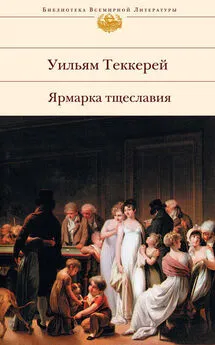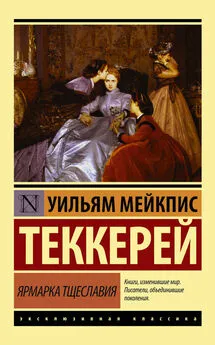Уильям Теккерей - Ярмарка тщеславия / Vanity Fair
- Название:Ярмарка тщеславия / Vanity Fair
- Автор:
- Жанр:
- Издательство:Литагент АСТ
- Год:2017
- Город:Москва
- ISBN:978-5-17-104403-9
- Рейтинг:
- Избранное:Добавить в избранное
-
Отзывы:
-
Ваша оценка:
Уильям Теккерей - Ярмарка тщеславия / Vanity Fair краткое содержание
Текст произведения незначительно адаптирован, снабжен грамматическим комментарием и словарем, в который вошли ВСЕ слова, содержащиеся в тексте. Благодаря этому книга подойдет для любого уровня владения английским языком.
Ярмарка тщеславия / Vanity Fair - читать онлайн бесплатно ознакомительный отрывок
Интервал:
Закладка:
Уильям Теккерей / William Makepeace Thackeray
Ярмарка тщеславия / Vanity Fair
© Селянцева Н. В., адаптация текста
© ООО «Издательство АСТ», 2017
1
On one shiny morning in June, there drove up to the great iron gate of Miss Pinkerton’s academy for young ladies, on Chiswick Mall, a large family coach, with two fat horses. As a black servant pulled the bell a score of young heads were seen in the narrow windows of the old brick house.
“It is Mrs. Sedley’s coach, sister,” said Miss Jemima.
“Have you completed all the necessary preparations for Miss Sedley’s departure, Miss Jemima?” asked Miss Pinkerton herself.
“The girls were up at four this morning, packing her trunks, sister,” replied Miss Jemima.
“We have also prepared her billet.”
In the present instance Miss Pinkerton’s “billet” was to the following effect:
– The Mall, Chiswick, June 15, 18
MADAM, – After her six years’ residence at the Mall, I have the happiness of presenting Miss Amelia Sedley to her parents, as a young lady worthy to occupy a fitting position in their refined circle. In leaving the Mall, Miss Amelia carries with her the hearts of her companions, and the affectionate regards of her mistress, who has the honour to subscribe herself, Madam, Your most obliged humble servant, BARBARA PINKERTON
P. S. – Miss Sharp accompanies Miss Sedley. It is particularly requested that Miss Sharp’s stay in Russell Square may not exceed ten days.
This letter completed, Miss Pinkerton wrote her own name, and Miss Sedley’s, in the fly-leaf of a Johnson’s Dictionary – the interesting work which she presented to her scholars, on their departure from the Mall.
Miss Jemima had taken two copies of the book. When Miss Pinkerton had signed the first, Jemima, with a timid air, handed her the second.
“For whom is this, Miss Jemima?” said Miss Pinkerton, with awful coldness.
“For Becky Sharp,” answered Jemima, trembling very much, and blushing. “For Becky Sharp: she’s going too.”
“MISS JEMIMA!” exclaimed Miss Pinkerton. “Are you in your senses?”
“Well, sister, it’s only two-and-nine pence, and poor Becky will be miserable if she doesn’t get one.”
“Send Miss Sedley to me,” said Miss Pinkerton. Poor Jemima trotted off.
Miss Sedley’s papa was a merchant in London, and a man of some wealth; whereas Miss Sharp was an articled pupil, for whom Miss Pinkerton had done, as she thought, quite enough. Now, Miss Amelia Sedley was a young lady and had many charming qualities. For she could not only sing like a lark, and dance, and embroider beautifully; and spell as well as a Dictionary itself; but she had such a kindly, smiling, tender, gentle, generous heart of her own, as won the love of everybody who came near her. When the departure came, Miss Sedley was greatly puzzled how to act. She was glad to go home, and yet sad at leaving school. The hour for parting came; Miss Pinkerton addressed to her pupil with admirable speech.
“You’ll go in and say good-by to Miss Pinkerton, Becky!” said Miss Jemima to a young lady of whom nobody took any notice.
“I suppose I must,” said Miss Sharp calmly. Miss Sharp came to Miss Pinkerton in a very unconcerned manner, and said in French, and with a perfect accent, “Mademoiselle, je viens vous faire mes adieux.” [1] Мадам, я хотела бы с вами попрощаться.
Miss Pinkerton did not understand French. She said, “Miss Sharp, I wish you a good morning.” “Heaven bless you, my child,” said she, embracing Amelia, and scowling over the girl’s shoulder at Miss Sharp.
“Come away, Becky,” said Miss Jemima, pulling the young woman away in great alarm, and the door closed upon them forever.
Then came parting below. Words refuse to tell it. All the servants were there in the hall – all the dear friend – all the young ladies – the dancing-master; and there was such hugging, and kissing, and crying, as no pen can depict. That is, Miss Sedley parted from her friends. Miss Sharp had entered the carriage some minutes before. Nobody cried for leaving HER. Sambo slammed the door of the carriage.
“Stop!” cried Miss Jemima, rushing to the gate with a parcel. “It’s some sandwiches, my dear,” said she to Amelia. “You may be hungry, you know; and Becky, Becky Sharp, here’s a book for you that my sister – that is, – Johnson’s Dixonary, you know; you mustn’t leave us without that. Good-by. God bless you!”
Just as the coach drove off, Miss Sharp put her pale face out of the window and actually flung the book back into the garden. The carriage rolled away; the great gates were closed; the bell rang for the dancing lesson. The world is before the two young ladies; and so, farewell to Chiswick Mall.
2
When Miss Sharp had seen the Dictionary, flying over the pavement of the little garden, fall at length at the feet of the astonished Miss Jemima, the young lady smiled, and she sank back in the carriage, saying – ”So much for the Dixonary; and, thank God, I’m out of Chiswick.”
Miss Sedley was almost as flurried at the act of defiance as Miss Jemima had been.
“How could you do so, Rebecca?” at last she said, after a pause.
“Why, do you think Miss Pinkerton will come out and order me back?” said Rebecca, laughing.
“No: but – ”
“I hate the whole house,” continued Miss Sharp in a fury. “I hope I may never set eyes on it again.
“Hush!” cried Miss Sedley. “Why, will the black footman tell tales?” cried Miss Rebecca, laughing. “He may go back and tell Miss Pinkerton that I hate her with all my soul; and I wish he would. I have been treated worse than any servant in the kitchen. I have never had a friend or a kind word, except from you. But that talking French to Miss Pinkerton was capital fun, wasn’t it? She doesn’t know a word of French, and was too proud to confess it, which made her part with me; and so thank Heaven for French.Vive la France! Vive l’Empereur! Vive Bonaparte!”
“O Rebecca, Rebecca, for shame!” cried Miss Sedley. And in those days, in England, to say, “Long live Bonaparte!” was as much as to say, “Long live Lucifer!” “How can you – how dare you have such wicked, revengeful thoughts?”
“Revenge may be wicked, but it’s natural,” answered Miss Rebecca. “I’m no angel.” And, to say the truth, she certainly was not.
Persons whom all the world treats ill, deserve entirely the treatment they get. The world is a looking-glass, and gives back to every man the reflection of his own face. Frown at it, and it will in turn look sourly upon you; laugh at it and with it, and it is a jolly kind companion; and so let all young persons take their choice. This is certain, that if the world neglected Miss Sharp, she never was known to do a good action for anybody.
Miss Sharp’s father was an artist, and had given lessons of drawing at Miss Pinkerton’s school. He was a clever man; a pleasant companion; a careless student. When he was drunk, he used to beat his wife and daughter; and the next morning, with a headache, he would rail at the world for its neglect of his genius, and abuse, with a good deal of cleverness, and sometimes with perfect reason, the fools, his brother painters. He was married to a young woman of the French nation, who was by profession an opera-girl.
Rebecca’s mother had had some education somewhere, and her daughter spoke French with purity and a Parisian accent. When her mother died, her father wrote a letter to Miss Pinkerton, recommending the orphan child to her protection and died too. Rebecca was seventeen when she came to Chiswick; her duties being to talk French, and her privileges to live cost free, and, with a few guineas a year, to gather scraps of knowledge from the professors who attended the school.
She was small and slight in person; pale, sandy-haired, and with eyes habitually cast down: when they looked up they were very large, odd, and attractive. By the side of many tall and bouncing young ladies in the establishment, Rebecca Sharp looked like a child. But she had the dismal experience of poverty. She talked to tradesmen to have a free meal granted, chatted with her father, who was very proud of her wit, and heard the talk of his wild companions – often ill-suited for a girl to hear. But she never had been a girl, she said; she had been a woman since she was eight years old. The rigid formality of the place suffocated her. She had a little room, where the maids heard her walking and sobbing at night; but it was with rage, and not with grief.
She had never mingled in the society of women. The gentle tender-hearted Amelia Sedley was the only person to whom she could attach herself in the least. The advantages of the young women round her gave Rebecca pangs of envy.
She took advantage, therefore, of the means of study the place offered her; and as she was already a musician and a good linguist, she speedily went through the little course of study which was considered necessary for ladies in those days.
Miss Pinkerton noticed her level of music performance and said to Miss Sharp that she was to instruct the children in music for the future.
The girl refused: “You took me because I was useful. There is no question of gratitude between us. I hate this place, and want to leave it. I will do nothing here but what I am obliged to do. Give me a sum of money,” said the girl, “and get rid of me – or, if you like better, get me a good place as governess in a nobleman’s family – you can do so if you please.”
Having Miss Pinkerton to attempt once to scold her in public, Rebecca hit upon the before-mentioned plan of answering Miss Pinkerton in French, which she couldn’t speak. [2] Столкнувшись с попыткой Мисс Пинкертон обругать ее на людях, Ребекка прибегла к уже испытанному способу отвечать Мисс Пинкертон на французском, который та не понимала.
In order to maintain authority in her school, it became necessary to remove this rebel, this monster, this serpent and hearing about this time that Sir Pitt Crawley’s family was in want of a governess, she actually recommended Miss Sharp for the situation.
Miss Sharp was invited by her friend Amelia to pass a week with her at home, before she entered upon her duties as governess in a private family.
Thus the world began for these two young ladies. For Amelia it was quite a new, fresh, brilliant world, with all the bloom upon it. It was not quite a new one for Rebecca.
At all events, if Rebecca was not beginning the world, she was beginning it over again. And when at length home was reached, Miss Amelia Sedley skipped out on Sambo’s arm, as happy and as handsome a girl as any in the whole big city of London.
You may be sure that she showed Rebecca over every room of the house, and everything in every one of her drawers; and her books, and her piano, and her dresses, and all her necklaces, brooches, laces, and gimcracks. She insisted upon Rebecca accepting the white cornelian and the turquoise rings, and a sweet sprigged muslin, which was too small for her now, though it would fit her friend to a nicety; and she determined in her heart to ask her mother’s permission to present her white Cashmere shawl to her friend. When Rebecca saw the two magnificent Cashmere shawls, which Joseph Sedley had brought home to his sister, she said, with perfect truth, “that it must be delightful to have a brother,” and easily got the pity of the tender-hearted Amelia for being alone in the world, an orphan without friends or kindred. “Not alone,” said Amelia; “you know, Rebecca, I shall always be your friend, and love you as a sister – indeed I will.”
Читать дальшеИнтервал:
Закладка:








